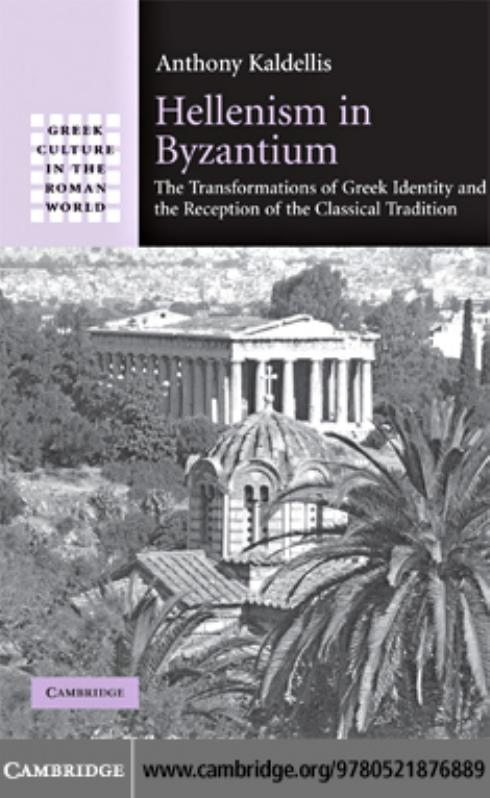Hellenism in Byzantium: The Transformations of Greek Identity and the Reception of the Classical Tradition (Greek Culture in the Roman World) by Anthony Kaldellis

Author:Anthony Kaldellis [Kaldellis, Anthony]
Language: eng
Format: mobi, epub, pdf
Publisher: Cambridge University Press
Published: 2008-01-31T05:00:00+00:00
Hellenism as an Expansion of Moral and Aesthetic Categories
Our focus will remain on that part of the literary spectrum that preoccupied itself with classical culture beyond what had been customary in Byzantium since the sixth century, for it was in those circles that new Hellenisms were performed. The question has rarely been posed why so many writers suddenly developed such an unprecedented level of interest in ancient Greece.[42] Psellos’ pioneering intellectual career and literary legacy contributed to this development, though what we need to know is why so many were prepared to receive him, given that they had incentives to avoid a major component of his philosophical project. Certainly, the economic and demographic expansion of the empire under the Komnenoi enabled more young men to acquire a higher education, while the emergence of an aristocracy with intellectual and artistic pretensions created a larger market for their skills. Such theories cannot be proven on the basis of the current evidence, yet there does seem to have been a broader and more diverse market for new literature in the twelfth century as opposed to the eleventh and a concomitantly larger production – hugely larger, if we remove the works of one man, Psellos, from the comparison. Part of the answer may lie in the nature of the new aristocracy and the attempts by a handful of second- and third-tier princes to act as mini-emperors by cultivating the traditional imperial image of artistic and literary patronage.
Despite a possible rise in the popularity of military saints at this time,[43] the Christian tradition proved unable to cater to the military-heroic êthos of the Komnenoi, at least as that was expressed in the history of the 1070s written by Nikephoros Bryennios, the son-in-law of Alexios, in ca. 1120. It celebrates the glorious deeds of martial nobles and is “Homeric” in that it accepts the values of Homer’s heroes as opposed to those of the poet himself (who kept a critical distance from the wrathful honor of Achilles). Martial exploits are emphasized throughout. Bryennios gives detailed descriptions of arms and armor, of the physical appearance and noble demeanor of great men, and of the impressions that they made on awestruck soldiers or commoners. In an astonishing break with the Byzantine tradition, he praises almost all noble warriors regardless of whether they were fighting for or against the legitimate government in Constantinople. As with Achilles, their nobility is independent of legality. Bryennios’ own family history would have predisposed him to such a view, as he was himself part of the Komnenian system, yet his grandfather had been defeated by Alexios (fighting on behalf of Nikephoros III Botaneiates) and blinded. He presents that war as one between two equivalent contestants, going so far as to state that his ancestor’s visage was so noble as to be “worthy of tyrannis,” (4.15), an amazing statement, given that in Byzantium tyrannis, or rebellion, had long been considered one of the worst offenses. The phrase is in fact lifted from a play of Euripides and recurs in two of Prodromos’ imperial poems as well.
Download
Hellenism in Byzantium: The Transformations of Greek Identity and the Reception of the Classical Tradition (Greek Culture in the Roman World) by Anthony Kaldellis.epub
Hellenism in Byzantium: The Transformations of Greek Identity and the Reception of the Classical Tradition (Greek Culture in the Roman World) by Anthony Kaldellis.pdf
This site does not store any files on its server. We only index and link to content provided by other sites. Please contact the content providers to delete copyright contents if any and email us, we'll remove relevant links or contents immediately.
| Africa | Americas |
| Arctic & Antarctica | Asia |
| Australia & Oceania | Europe |
| Middle East | Russia |
| United States | World |
| Ancient Civilizations | Military |
| Historical Study & Educational Resources |
The Daily Stoic by Holiday Ryan & Hanselman Stephen(3304)
The Fate of Rome: Climate, Disease, and the End of an Empire (The Princeton History of the Ancient World) by Kyle Harper(3059)
People of the Earth: An Introduction to World Prehistory by Dr. Brian Fagan & Nadia Durrani(2733)
Ancient Worlds by Michael Scott(2682)
Babylon's Ark by Lawrence Anthony(2673)
The Daily Stoic by Ryan Holiday & Stephen Hanselman(2572)
Foreign Devils on the Silk Road: The Search for the Lost Treasures of Central Asia by Peter Hopkirk(2463)
India's Ancient Past by R.S. Sharma(2451)
MOSES THE EGYPTIAN by Jan Assmann(2412)
The Complete Dead Sea Scrolls in English (7th Edition) (Penguin Classics) by Geza Vermes(2277)
The Earth Chronicles Handbook by Zecharia Sitchin(2227)
Lost Technologies of Ancient Egypt by Christopher Dunn(2223)
24 Hours in Ancient Rome by Philip Matyszak(2078)
Alexander the Great by Philip Freeman(2064)
Aztec by Gary Jennings(2023)
The Nine Waves of Creation by Carl Johan Calleman(1916)
Curse Tablets and Binding Spells from the Ancient World by Gager John G.;(1860)
Before Atlantis by Frank Joseph(1849)
Earthmare: The Lost Book of Wars by Cergat(1825)
